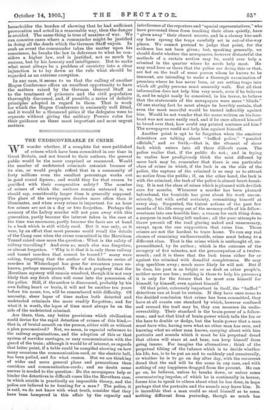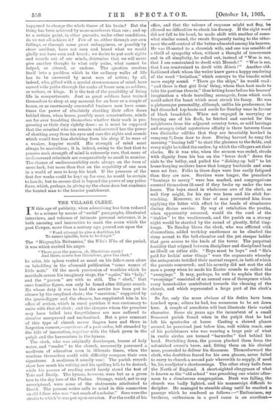W E wonder whether, if a complete list were published of
crimes which have been committed in our time in Great Britain, and not traced to their authors, the general public would be the more surprised or reassured. Would the number of undetected criminals astonish because of its size, or would people reflect that in a community of forty millions even the smallest percentage works out in good round figures ; and would they for that reason be gratified with their comparative safety ? The number of crimes of which the authors remain untraced is, we should say, considerably larger than is generally supposed. The glare of the newspapers dazzles more often than it illuminates, and when every crime is important for an hour few crimes are not in a day or two forgotten. Perhaps the memory of the Lefroy murder will not pass away with this generation, partly because the interest taken in the case at the time was enormous, partly because the facts are at hand in a book which is still widely read. But it was only, as it were, by an effort that most persons could recall the details of the Camp case when the crime committed in the Merstham Tunnel raised once more the question : What is the safety of railway travelling ? And even so, much else was forgotten, or almost forgotten. "Why is it that it is only these railway and tunnel murders that cannot be traced ? " many were asking, forgetting that the author of the hideous series of murders in Whitechapel has gone for seventeen years un- known, perhaps unsuspected. We do not prophesy that the Merstham mystery will remain unsolved, though it is not very likely that any fresh clues will come into the possession of the police. Still, if the author is discovered, probably by his own failing heart or brain, it will not be another ten years before his name, too, will be remembered with difficulty. Of necessity, sheer lapse of time makes both detected and undetected criminals tho more readily forgotten; and for what it is worth, the lapse of time must always be on the side of the undetected criminal.
Are there, then, any better provisions which civilisation could devise for the rapid detection of crimes of this kind,— that is, of brutal assault on the person, either with or without a plan preconceived? Not, we mean, in especial reference to the railway organisations, and the adoption of this or that system of corridor carriages, or easy communication with the guard of the train ; although it would be of interest, as regards that latter point, if a table could be compiled showing on how many occasions the communication-cord, or the electric bell, has been pulled, and for what reason. But we are thinking of wider and more general plans and precautions than corridors and communication-cords ; and no doubt some answer is needed to the question : Do the newspapers help or hinder the detectives in difficult cases like the Merstham case, in which suicide is practically an impossible theory, and the police are believed to be hunting for a man ? The police, it is said, we do not know with what truth, consider that they have been hampered in this affair by the rapacity and interference of the reporters and "special representatives," who have prevented them from tracking their clues quietly, have "given away" their closest secrets, and in a clumsy hue-and- cry have sprung the traps carefully set in out-of-the-way places. We cannot pretend to judge that point, for the evidence has not been given ; but, speaking generally, we should doubt whether the newspapers, however distasteful the methods of a certain section may be, could ever help a criminal in the quarter where he needs help most. He may read here or there that the police are doing this or that, are hot on the trail of some person whom he knows to be innocent, are intending to make a thorough examination of premises where he has never been, or are setting traps into which all guilty persons must assuredly walk. But all that information does not help him very much, even if he believes it, and he might easily be conceived, in his terror, to believe that the statements of the newspapers were mere "blinds." Of one staring fact he must always be horribly certain, that even the most merciful would be turned inflexibly against him. Would he not wonder that the name written on his fore- head was not more easily read, and if he once allowed himself to brood over that, how could any printed sentence aid him ? The newspapers could not help him against himself.
Another point is apt to be forgotten when the amateur detectives are talking about "baffled police," "puzzled officials," and so forth,—that is, the element of sheer luck which enters into all these difficult cases. The police realise that, if the public do not ; and in trying to realise how prodigiously thick the mist diffused by mere luck may be, remember that there is one particular class of crime in which, if the luck is on the side of the police, the capture of the criminal is so easy as to attract no notice from the public ; if, on the other hand, the luck is with the criminal, the task of the police is almost heart-break- ing. It is not the class of crime which is planned with devilish care for months. Whenever a murder has been planned beforehand, the homicide has gone about his work uncon- sciously, but with awful certainty, committing himself at every step. Suspected, the tiniest actions of the past few months of his life creep out of the memory-cells of his fellow- creatures into one horrible line; a reason for each thing done, a purpose in each thing left undone ; all the poor attempts to throw pursuit off the trail glaring naked and unnecessary, except upon the one supposition that ruins him. Those crimes are not the hardest to trace home. To run any real chance of remaining undiscoverable, crime must belong to a different class. That is the crime which is unthought of, mr- premeditated, by its author ; which is the outcome of the savagery of fire minutes, not the preoccupation of a twelve- month ; and it is there that the luck turns either for or against the criminal with dreadful completeness. He may step speckless away ; much more likely be will not. But if he does, his past is as bright or as drab as other people's, neither more nor less ; nothing is there to help his pursuers ; it is only for the future that he must arm himself for himself, by himself, even against himself.
Of that point, extremely important in itself, the " baffled " detectives can at least be certain. If they have once come to the decided conclusion that crime has been committed, they have at all events one standard by which, however confused and crossed the trail may be, they can measure its undis- coverability. Their standard is the brain-power of a fellow- man; and not that kind of brain-power which tells the fox or the hare to double or dodge, but the brain-power that a man must have who, having seen what no other man has seen, and knowing what no other man knows, carrying about with him portraits and sounds which it must be his perpetual dread that others will stare at and hear, can keep himself from going insane. For imagine the alternatives ; think of the perpetual tilting of the balance which is to decide whether his life, too, is to be put an end to suddenly and unnaturally, or whether he is to go on day after day, with the recurrent dread that the end will be the same in any case, and with nothing of any happiness dragged from the present. He can go on, he believes, unless he breaks down, or unless some overmastering impulse, of which he is continually in horror, forces him to speak to others about what lie has done, in hope perhaps that the portraits and the sounds may leave him. It is incredible that a man could so steel himself as to seem nothing different from yesterday, though so much has happened to change the whole tissue of his brain ? But the thing has been achieved by more murderers than one ; and up to a certain point, in other pursuits, under other conditions, do we not all achieve it? Few of us, either through our own failings, or through some great unhappiness, or possibly by sheer accident, have not seen and heard what we would gladly not have seen and heard; we desire to put such sights and sounds out of our minds, determine that we will never give another thought to what only pains, what cannot be helped, or altered, or undone. The question resolves itself into a problem which in the ordinary walks of life has to be answered by most men of action; by all, indeed, who, gifted with a special strenuousness of mind, have carved wide paths through the ranks of lesser men, as soldiers, or writers, or kings. It is the test of the possibility of living life in compartments. Just as great soldiers have trained themselves to sleep at any moment for an hour or a couple of hours, or as enormously successful business men have some- times the power of absolutely shutting their office doors behind them, when lesser, possibly more conscientious, minds are for ever troubling themselves whether their work is pro- gressing or their duty rightly done ; so it must be supposed that the criminal who can remain undiscovered has the power of shutting away from his eyes and ears the sights and sounds which would tear him shrieking from his sleep if he were of a weaker, happier mould. His strength of mind must always be marvellous ; it is, indeed, owing to the fact that to possess such strength of mind is extremely rare, that cases of undiscovered criminals are comparatively so small in number. The chance of undiscoverability rests always on the turn of mere luck, but more than that on the capability of one man in a world of men to keep his head. If the pressure of the first few weeks could be kept up for ever, he would be certain to lose it; but to ensure that is beyond the power of any police force, which, perhaps, in giving up the chase does but condemn the hunted man to the heavier punishment.















































 Previous page
Previous page